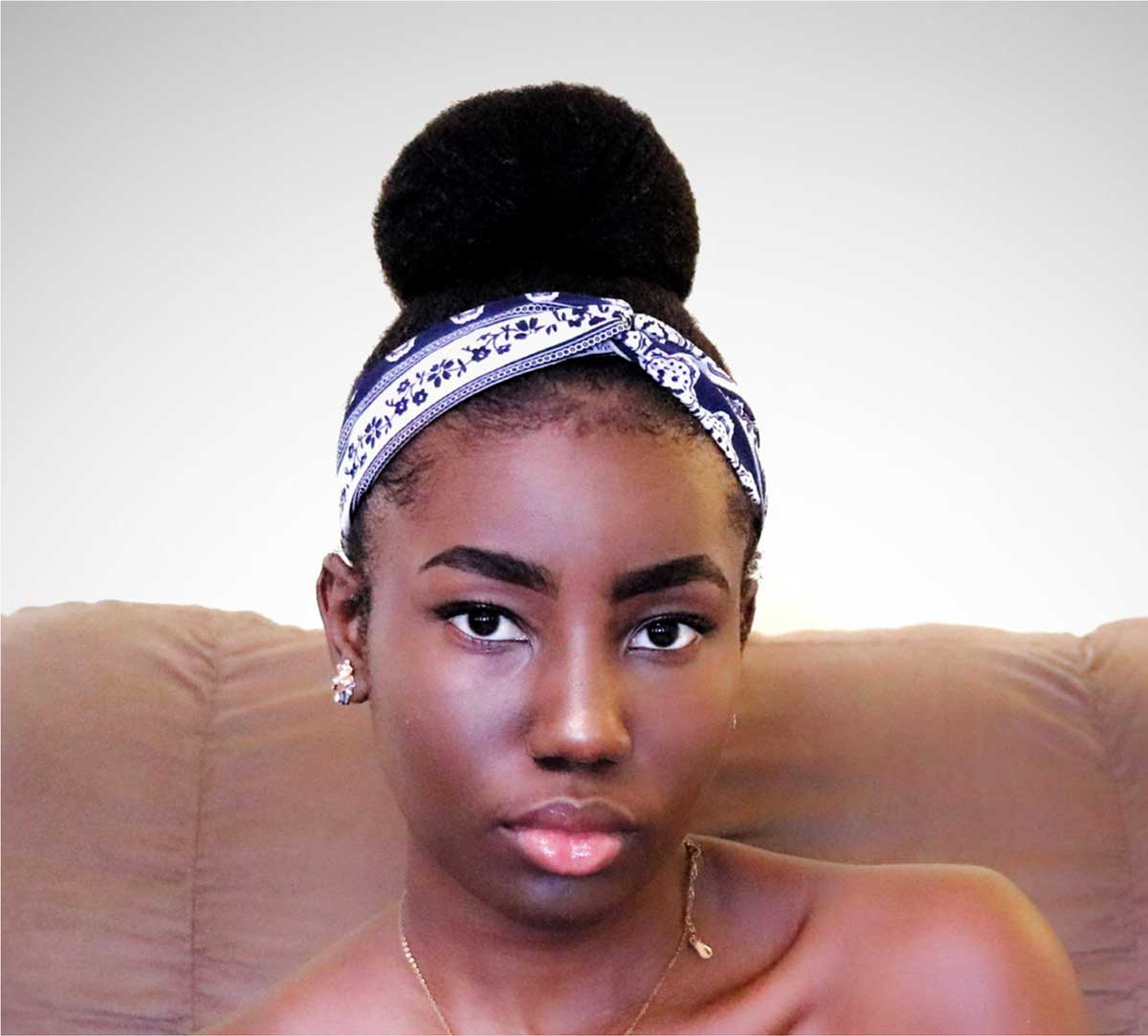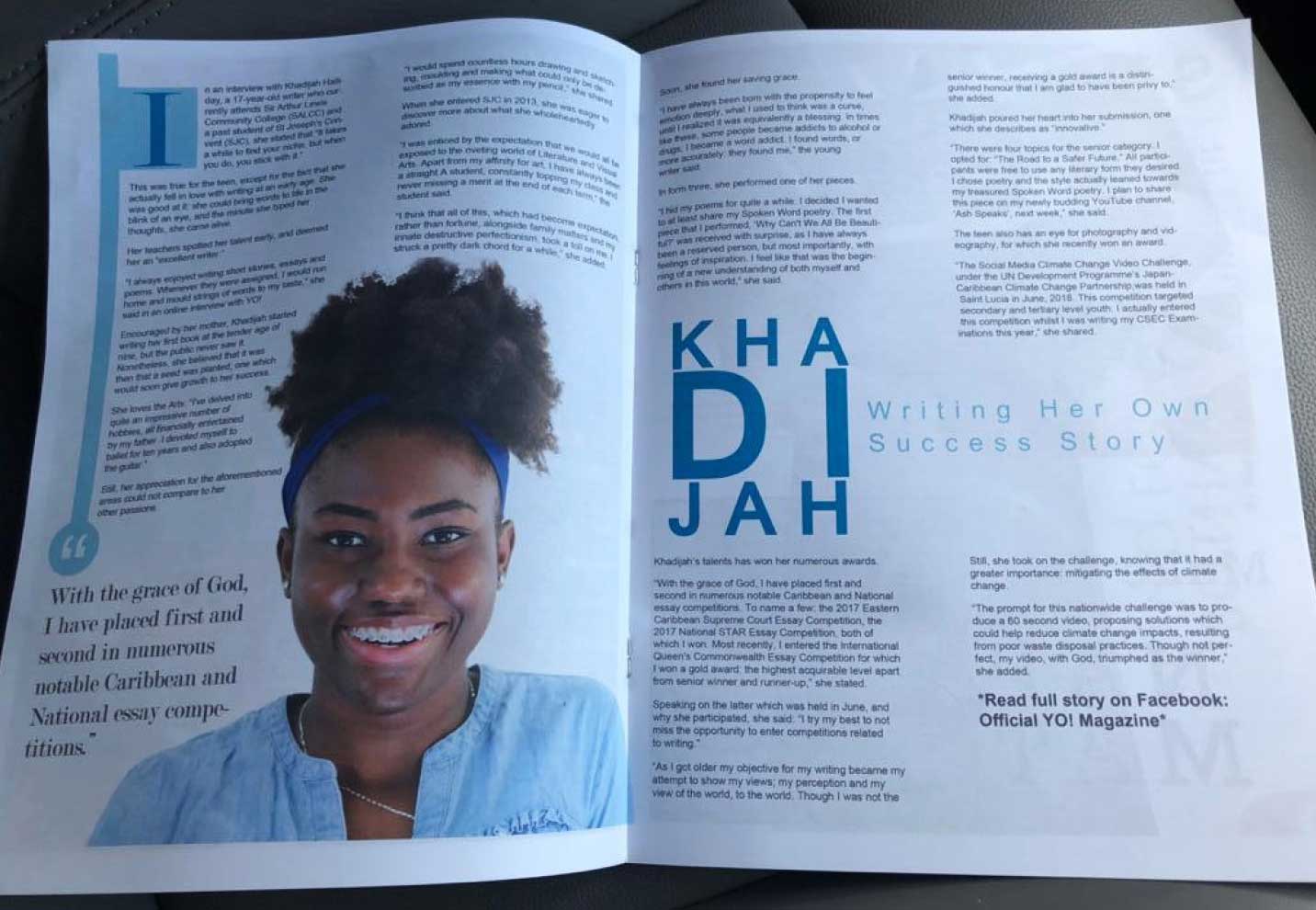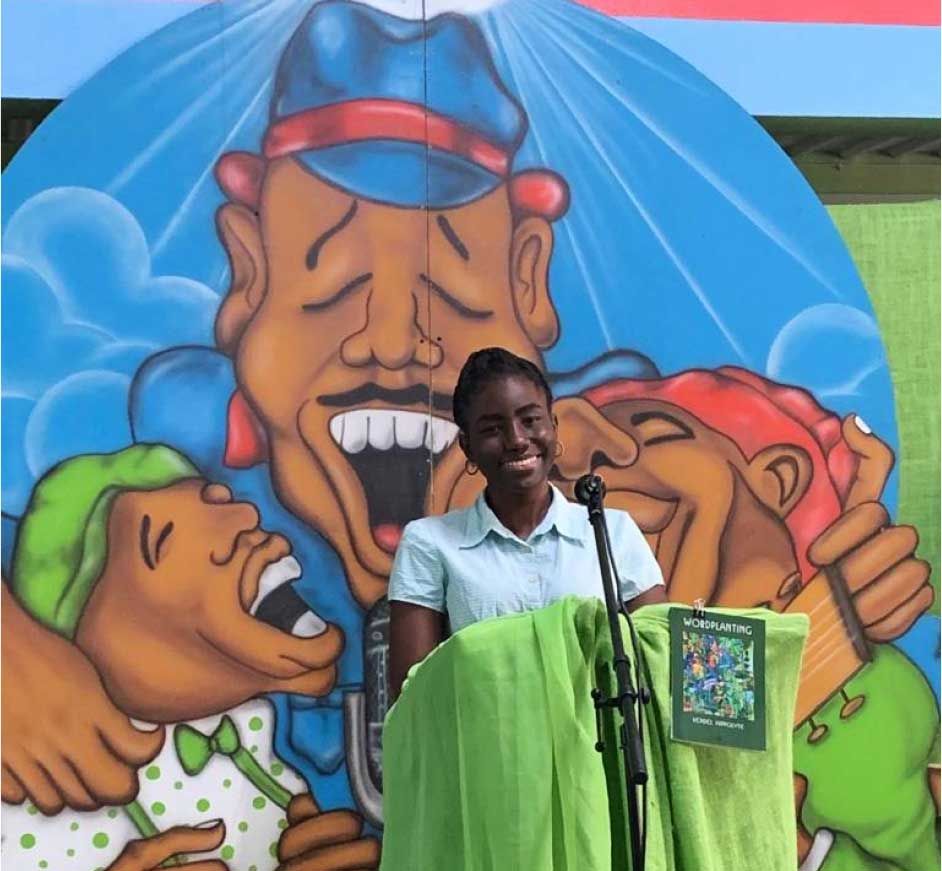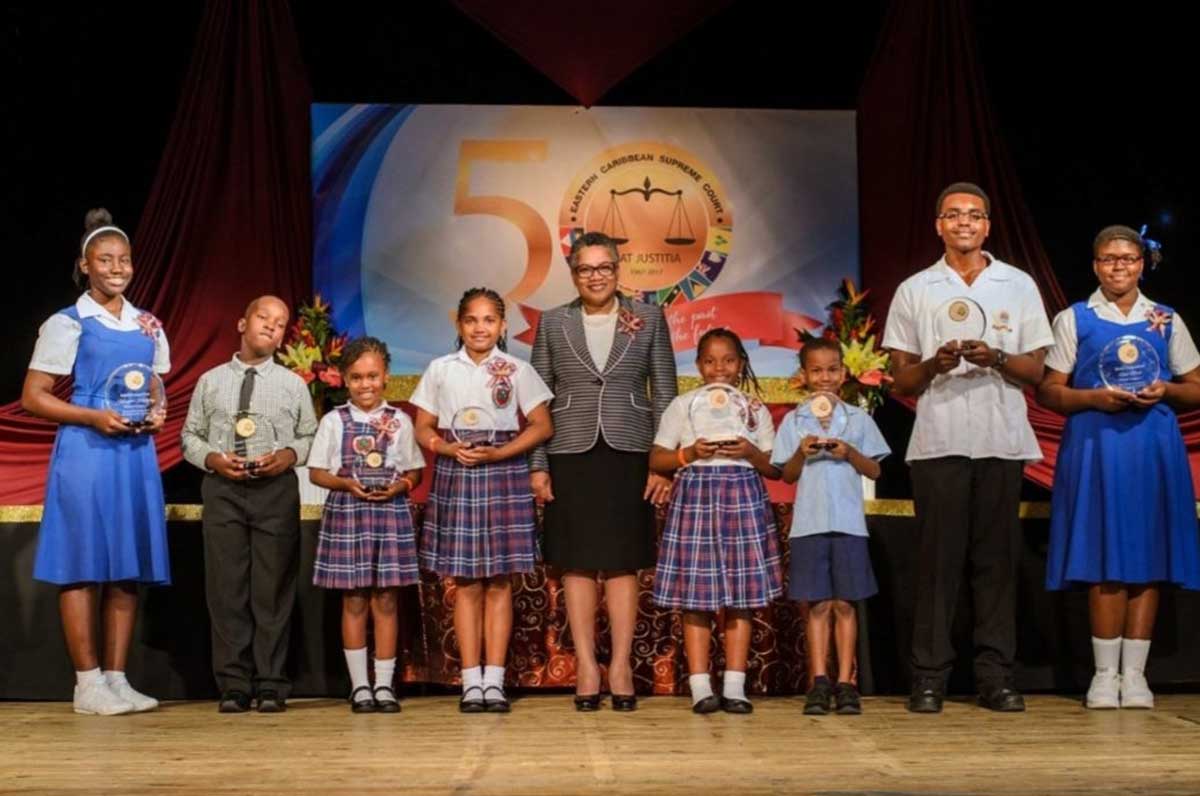This month, OECS YES In Action caught up with Khadijah Halliday, a 19-year-old Spoken Word Artiste and Writer tackling the stigma of mental illness in the Caribbean through empowering videos, poetry and prose!

Tell us a little about yourself.
My love affair with words began at a really early age. My childhood years were spent going to school for eight hours and then coming home to read for another eight. After devouring book after book, I had the epiphany that I didn’t need to always be the one being inspired—I could be the one doing the inspiring.
Via my own personal experiences, it became overt to me that words harbour infinite power. My notebooks— embroidered with threads of words painstakingly stitched together —are like treasures to me, in light of my knowledge of the miraculous, medicinal properties of words.
To keep a universal cure like this to myself would have been unforgivably selfish. This was the realisation that propelled the creation of my online persona: AshSpeaks.
AshSpeaks is the virtual space in which I combine my two passions: 1) Mental health advocacy; and 2) Creative writing, particularly spoken word poetry. For me, Ash is the raw, unencumbered form of my human condition. Her Instagram page @ashspeaksagain, is essentially my diary. Ash bares the inner workings of her mind to the public. Her primary aim is to reach those who feel similarly so that less persons believe they are struggling alone.

People often ask me, how is it that I can easily share such intimate parts of myself. I can easily answer, “Quite comfortably”. Once the vulnerability is contained in a quote or a poem or a spoken word piece, I have no reservations about sharing with the world. Apart from healing, words can also protect. Words protect me.
Ash or AshSpeaks is the product of unmatched vulnerability, naked emotion and phenomenal amounts of courage. I like to say that she is the unmasked version of Khadijah Halliday.
When did you first notice your inclination towards Mental Health Advocacy? What motivated you to start?
It is common knowledge that our home in the Caribbean harbours heavy stigmatisation surrounding mental illness and I, having experienced challenges of my own, was firsthand impacted. As a young student in school, I recognised others like myself who were afraid to speak up, terrified that they would be dismissed; it was then I realised that I had yet to as well.
This was one of the primary reasons that prompted me to speak up, and so began my long journey to healing—healing that I came to realise that my writing had already started. I began the journey to escape a deep pit that I spent years believing was bottomless and I want…I need… to provide kids, who are of this same mindset, a way out by doing what I can, with my words, to validate their pain.
Have you encountered any major challenges in your journey to this point?
15. That’s the number of houses I have lived in during my nineteen years of existence. Residing in the Caribbean, I have moved between a total of four different islands, held citizenship for three (OECS countries), carried a passport for two and of course, I am currently living in one. I have moved a lot.
This lack of physical stability was a result of numerous factors, some of which contributed to my preoccupation with perfectionism leading into my adolescent years. As a future psychology major, I believe it apt for me to infer that my desire for both academic and extracurricular perfectionism reflected my desire for a perfect home—or at least one that was not losing its definition of home.
Unsurprisingly, this all took a great toll on me psychologically and I developed crippling anxiety. Lots of kids have had an imaginary friend and so did I—except that it was not imaginary. It was named: Anxiety. I grew up alongside it; I did my homework with it; I went out to my friends’ birthday parties with it. I kept it a secret for many years but the second that it started severely disrupting my academic functioning in school, I panicked and despite its vehement protests, I confessed the existence of our parasitic friendship.
As a result, my experiences with my mental health have collectively been a major challenge for me. However, these experiences have tremendously deepened the reach of my writing and of course, are at the seat for my championing for mental health awareness.
When I ask people close to me to encapsulate my character in one word, their list of words can for the most part, be encapsulated in one word: empathetic. My own journey with mental illness is the reason for this.
Persons open up to me because they suspect, and are later proven, that I am ready to thoroughly engage in discussions that many people, particularly in our small region, are not. This involves engaging in topics that some still don’t think we are ‘ready’ to talk about. It is through these hard conversations that breakthroughs—transformations—come to fruition.
The COVID-19 pandemic has had a major impact on the work of young people. How have you been able to cope with the uncertain times brought about by the pandemic?
Ha, God only knows.
I wish that I could say that I was kidding but the truth is, I still do not know for certain. Wholly truthfully, there were months that I severely doubted that I would make it to another year. But then the next month came…and they kept coming…and coming….and so, I was constantly proven wrong.

I think that for the most part, I spent the majority of 2020 engaging in thorough, extensive, detailed introspection. I suppose that since I was not permitted to leave the house, I cozied up in my head instead. And as an extremely reserved introvert, I was definitely not a stranger to taking residence up in my head but 2020 truly brought me to a whole new level.
Honestly, however, in times when I had enough of grueling self-reflection, I would bury myself in something else – such as a new video idea when I felt productive or yes, a new binge-worthy Netflix series when I needed a dose of self-care. I confess the latter unabashedly.
Additionally, I think that as the year neared its end, I truly began to understand that to survive meant listening to my mind—listening to when my mind needed to rest.
I had to learn that it is not a sin to take a break.
It is not blasphemous to rest.
It is not unlawful to extend compassion to yourself.
How have you used your platform/work to provide relief to young people or raise awareness during the pandemic?
During the pandemic, there were three main collaborative video projects that I piloted. These short films engaged members of my community of varying demographics and Caribbean nationalities: Saint Lucia, Barbados, Grenada, St. Kitts and Nevis, Jamaica, and Trinidad and Tobago.
ATTENTION all Quarantine Survivors: The aim of this video was to celebrate all our efforts, as a Caribbean people, during the arduous quarantine period REGARDLESS of our expected productivity levels. It took the form of a compilation of many video clips from the aforementioned wide range of Caribbean participants. The discussion centered around the psychological impact of the Covid-19 shut-down and elucidated on various reasons that we cannot live up to all the “ideal” expectations that much of the mainstream media projected.
ATTENTION all 2020 Survivors: Likewise, the sequel was collaborative as well, with a few new faces joining enthusiastically. This video’s aim was to transcend the overt negativity of 2020 by drawing attention to the positive aspects of this experience, with the purpose of hopefully refueling hope.
Assassinating Hope: A Poetic Documentary: This film was the most personal and thus naturally, the one closest to my heart. “Assassinating Hope” is a raw, inspiring, creative short film that outlines my personal inner conflict with hope. It is an autobiographical poetic documentary pivoted around potent, realistic themes of aspiration, survival and resilience. The film features my original spoken word poetry which personifies the entity of Hope as the narrator’s close comrade who I deliberately attempt to distance from, upon self-constructing my own revolutionary equation: Hope + Future = Disappointment—an equation that illustrates a life devoid of pain, suffering and affliction as a life completely devoid of hope. Determinedly setting out on a journey to ‘assassinate hope’, I stumble upon many truths about hope as a concept and ironically begin to recognise its necessity in my life. I learn to rewrite the aforementioned equation and replace it with one that instills a lot more “hope” in the viewer. The dynamic imagery in this short film is a mark propelling the viewer to examine the parallels between oneself and the abstract entity we title “hope”. Hope is violently resilient. We ought to be…like her. All in all, the overall message of this self-refection is purely exhortation and resilience amidst life’s many adversities.
What are some accomplishments that you are most proud of?
Passionate about all kinds of writing, I can self-associate with a myriad of titles: spoken word artist, poet, fiction writer, columnist. Accordingly, most of my extracurricular activities surround writing: from being accepted to the highly selective Kenyon Review Young Writers’ Residential Workshop in Ohio, United States to commencing my own column AshWrites in the bimonthly SLYou Magazine.
Moreover, I am thrilled to have been worthy of publication in international waters: the Canvas Literary Journal, a leading New York-based youth literary publication, and the Ohio Based Kenyon Review Young Writers Anthology.
But more pressingly, I admit that I have neglected to mention another one of my fervent passions: Competing.
I relish competition, whether they be national, regional or international—or whether they be for videography, art, or writing. I enter as many as are available to me.
For instance, for the past three consecutive years, I have participated in the Eastern Caribbean Central Bank Creative Youth Competition, being awarded 2nd, 1st and 3rd respectively. Additionally, I earned two Gold Awards consecutively in both the 2019 and 2018 International Queen’s Commonwealth Essay Competition. Amongst others not mentioned, the Eastern Caribbean Supreme Court Essay Competition, in which I placed 1st, was another opportunity to compete doing what I love.
What advice would you give to young people as they look to navigate past the COVID-19 era?
I will give the four pieces of advice that I gave in my most recent video.
- Number 1: Allow yourself to mourn 2020
Go after your dreams; Set ambitious goals; Endeavour to fulfill your resolutions. However, do not force yourself to distance from the events of 2020. See, many of us are currently still in the process of comprehending the impact that 2020 has had on us both ‘intrapersonally’ and interpersonally. Therefore, it is okay if you still need time to grieve for the person you lost… the parts of you that left…the persons who are no longer in your world. It is wholly acceptable to take the time to grieve. Do not rush the transition. Allow yourself the gradual departure from the year.
- Number 2: Feel proud of you
Many people did not believe they would survive 2020. However, we are a lot stronger than we give ourselves credit for. I, therefore, think that it is so important to recognise that you made it out of such a scary, hectic, arduous, anxiety-filled, depression-laden period. Take the time to marvel at the strength you did not even know you had. Reflect on it. Dwell on it. Let it cement. You are resilient and are capable of overcoming the most trialing of circumstances. 2020 was proof of that.
- Number 3: Allow yourself to experience 2021
2021 is not going to magically be an easier year. Many of the events of 2020 are still going to be having serious consequences in 2021. However, we should not try to end each moment before each moment is lived in. Most of 2020 was just waiting for it to finish…just yearning for another year. Let us not live 2021 like this. 2021 is the year to put the lessons we learnt in 2020 into motion. It is the year to live based on all that was revealed to us in 2020 because we did learn a lot. Undoubtedly.
And most importantly,
- Number 4: Extend grace to yourself.
Allow yourself to do the wrong thing and learn from it…to be human. Understand that you do not have all the answers and in order to get some of the answers that are pertinent to your growth, you have to go through these experiences. In every moment, we are adding to our repertoire of knowledge…our repertoire of self-awareness. Empathise for your younger self. Empathise for your struggling self. Empathise with your growing self. Extend gargantuan amounts of grace to yourself.
Do you have any plans to increase the impact of your work?
I will simply answer yes.
This year moving forward, I hope to be much more involved in my channel, create more videos, and gain a larger following of persons who connect with my words.
Many of the strategies to achieve all of this are still in the works. Therefore, as stated previously, I will simply say yes.
Is there anything else that you want to share with our audience to know about you or your work?
No matter the community I visit, it will quickly become known that healing is my passion. I am wholly dedicated to it, whether it be with my writing or with my advocacy. You see, I do not want to leave this world as one face in seven billion. I just cannot. I want—I need—to connect, touch and aid with the healing process, with as many people as I can. I write, I perform, I connect….to heal.
So no, I don’t write to fill notebooks. I write to transform lives.





![Simón Bolívar - Liberator of the Americas [Photo credit: Venezuelan Embassy]](https://thevoiceslu.com/wp-content/uploads/2025/12/Simon-Bolivar-feat-2-380x250.jpg)




Aa 19-year-old Spoken Word Artiste and Writer tackling the stigma of mental illness is missing a very real opportunity to address those taught and teaching that prejudice.